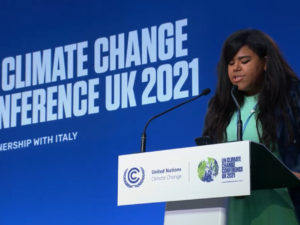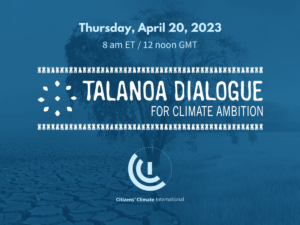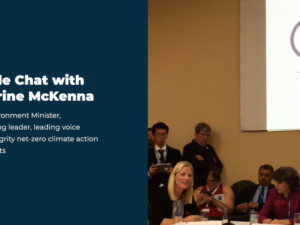
Citizens’ Climate International groups joined Climate Clock’s Global Day of Action on July 22 with events in French — Plus tard, c’est trop tard! — and English

CCI Africa Regional Coordinator David Michael Terungwa.
At noon on July 22, the human race officially marked less than five years to dramatically reduce fossil fuel pollution in a bid to stay below 1.5C degrees warming.
Over three dozen communities, which included members of Citizens’ Climate International, watched the Climate Clock tick below five years for the first time during the Climate Clock’s Climate Emergency Day.
The aim of Climate Emergency Day is to direct pressure on those in power and to demand that leaders act in time to prevent further catastrophic climate disasters.
According to the United Nations, fossil fuels account for over 75% of greenhouse gas emissions and 90% of carbon dioxide emissions that trap the sun’s heat. The facts are clear: burning fossil fuels adds more heat to the atmosphere. A warmer atmosphere holds more water, which in turn makes weather systems more volatile and unpredictable.
The call for this year’s Climate Emergency Day 2024 focused specifically on divestment from fossil fuels and investment in our collective future.

Roland Olivier DEDI, CCI leader in Côte d’Ivoire, holds the Climate Clock and is the Côte d’Ivoire lead for Climate Clock.
Cameroon

Anjianjei Constantine leads the Climate Clock demonstration in Cameroon.
In Cameroon, 15 victims of last year’s devastating floods in Buea joined 15 climate and nature activists and volunteers on a 15-kilometer march to call for climate justice and climate finance now to address local and national climate emergencies, carbon pricing, end fossil fuels, and fund a renewable future in Cameroon.
Sudbury, Ontario, Canada

CCL Canada held a Climate Clock event in Sudbury.
CCL Sudbury, in partnership with the United Church of Canada and Fridays For Future Greater Sudbury, held a Climate Clock event, too. Al Douglas, president of the Ontario Climate Risk Institute, gave a sobering presentation about their 553-page climate change report that was commissioned in 2020. They presented it to the government of Ontario in January 2023, which quietly released it publicly on a government website on Aug. 25, 2023, after an open letter from Seniors for Climate Action NOW launched in late July 2023 garnered 1,200 signatures that put pressure on the government to release it.
Sophia Mathur presented an interactive climate change solutions website, En-ROADS. Their event was broadcast on Youtube and a recording is viewable here. The event generated media coverage in English and French.
It is important to note that concerns about climate change do increase after global days of action, and so we thank all of our volunteers who do this work.
About Climate Clock
The first Climate Clock was launched in Union Square, New York City, in September, 2020 and is based on data from the Intergovernmental Panel on Climate Change. It quickly went viral and has a global presence, with monument-sized clocks in London, Rome, Seoul, Daegu and Harrisburg, Pennsylvania, and portable clocks in the hands of climate leaders across the world, from Greta Thunberg to Bill McKibben to Bahamas Prime Minister Phillip Davis.
The Climate Clock urges governments, corporations, and people in power to act in time for the climate crisis. It exhibits a ‘Deadline’ counting down the time remaining to prevent global warming from rising above 1.5°C and six ‘Lifelines’ tracking progress on key solution pathways, including the percentage of the world’s energy from renewable sources (13.7%), the amount of land currently protected by Indigenous peoples (43m km sq), the Loss & Damage Financing owed by G20 Nations to the most vulnerable nations ($32.7T), the percentage of women in national parliaments (24.5%), the total funds divested from the fossil fuel sector ($40.51T), the global land area cultivated in accordance with regenerative agriculture practices (1,302,905 HA).
We encourage our groups around the world to participate in the next major global day of action for climate: Friday, September 20, 2024.








